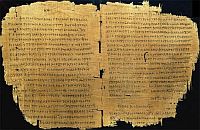“For I bear them witness that they have a zeal for God, but not according to knowledge.” – Romans 10:2
 These words were spoken by Paul testifying to the Jews zeal for God, His ways, His acts, His words. Yet their zeal for God, as he says, was not according to knowledge. The whole discourse of Romans chapters nine through eleven is dealing with the unbelief of the Jews as a whole and how it is God’s promises to them still stand in light of the fact that a majority of the nation of Israel rejected the Messiah, Jesus. Paul’s undeniable response as to why God’s promises still stand is that not all physical Israel (Israelistes) is spiritual Israel (all of God’s people for all time), but rather His promise stands according to election, that is, His choice, not ours, in who He wants to save through granting faith.
These words were spoken by Paul testifying to the Jews zeal for God, His ways, His acts, His words. Yet their zeal for God, as he says, was not according to knowledge. The whole discourse of Romans chapters nine through eleven is dealing with the unbelief of the Jews as a whole and how it is God’s promises to them still stand in light of the fact that a majority of the nation of Israel rejected the Messiah, Jesus. Paul’s undeniable response as to why God’s promises still stand is that not all physical Israel (Israelistes) is spiritual Israel (all of God’s people for all time), but rather His promise stands according to election, that is, His choice, not ours, in who He wants to save through granting faith.
Reflecting on this verse in particular though made me think not so much in terms of the Jews as a whole though, but rather my own heart (the first place we should start in applying the Scriptures) and its daily tendencies toward unbelief, and in our own day, specifically within evangelicalism at large within America. There are many people in our culture who claim to be Protestant Christians, who claim the title born again, claiming to be regenerated by the power of God from death to life, and yet their lives are totally out of sync with that confession, living as if they had never been born of God’s Spirit. There is no outward evidence pointing to the inward, supernatural reality that the Holy Spirit has indwelt their hearts. This verse makes me think about this a lot. How many of us in our Evangelical Christian Culture have a zeal for God, just as the unbelieving Jews did, yet a zeal not according to knowledge, that is, a zeal for God outside of the Gospel? No one can definitively know of course, for only God sees the belief or unbelief of the heart. Yet there are clear indications in Scripture (James, 1 John) that point in one direction or the other.
Surely, there are many many people nowadays who have a zeal for God, for His ways (as long as they are the positive attributes), His acts (the same), and so on. Yet based upon Paul’s assessment of his own kinsmen in this verse, it is probable many even in our own time possess this zeal for God outside of the Gospel, which ultimately leads to eternal punishment, because if you have a zeal for God outside of Christ, ultimately, your salvation is based on works and not on faith alone. It is not enough to simply have a zeal for God outside of trusting Christ’s work on your behalf. You need to be saved from the core of your being outward, by His power and Spirit. You need God-produced faith in you that sees and trusts Jesus as Savior, not merely a zeal for Him that pursues Him on your own efforts and works.
This was the error of the Jews in Paul’s day: they had rejected the Messiah and setup their own righteousness as what made them acceptable in God’s eyes. Sure, they had a zeal, desire, and even head-knowledge of God. Yet as Paul says, it was not according to knowledge and they found themselves outside of the grace of God, under the wrath of God, even at that moment (John 3:36). What kind of knowledge do we need though? Divinely granted knowledge revealed in Scripture, for how else can we know God unless He opens our minds, hearts, wills, and souls to see and receive Him (John 3:1-10)? We need God’s divine knowledge of the Gospel and we need Him to work in our hearts so that we love and trust Him in truth, in Gospel-knowledge.
What is so saddening about the unbelief of the Jews Paul seeks to explain in Romans nine through eleven is the way he prefaces this whole section in Romans 9:1-5:
I am speaking the truth in Christ—I am not lying; my conscience bears me witness in the Holy Spirit— that I have great sorrow and unceasing anguish in my heart. For I could wish that I myself were accursed and cut off from Christ for the sake of my brothers, my kinsmen according to the flesh. They are Israelites, and to them belong the adoption, the glory, the covenants, the giving of the law, the worship, and the promises. To them belong the patriarchs, and from their race, according to the flesh, is the Christ who is God over all, blessed forever. Amen.
Just consider for a moment all of the vast privileges the Jews had. Yet Paul is lamenting their unbelief! To them belong the adoption, the glory, the covenants, the law, the worship, the promises, and ultimately from them came Jesus Himself. What an honor and privilege! And oh how sad it is, they are outside the grace of God, because God has now spoken to us by His Son (Hebrews 1:1-4). To reject Him is to reject God and be forever under His just wrath.
Consider today for a moment all of the vast privileges we have in this nation: freedom of expression, the unfettered ability to preach the Gospel, the mass media, a (relatively, compared to other nations) stable economic environment, the freedom to meet together on Sunday’s to worship. And yet I fear the same thing for many people here Paul did for his brothers, the Israelites: there seems to be a zeal for God that is not according to knowledge on a mass scale in evangelicalism. I turn on the television and see preachers say nothing of the core content of the Gospel, even the basics, just simply that “God loves you.” That is not the Gospel, it is a half-truth at best, which as J.I. Packer says becomes a complete untruth. I hear radio sermons that mention nothing of Christ’s blood sacrifice on behalf of sinners. I see church websites that offer nothing of what they actually believe concerning Christ and His work, who go under the label evangelical. I’m not talking about doctrinal precision, I’m talking about Gospel precision, where is it? For many preachers, teachers and lay people, “God loves you” is all they need to hear, without all the fuss of sin and justice talk. Yet this is not a message according to knowledge, divine Gospel-knowledge. It is a message that Satan seeks to use by watering down and mute the Biblical Gospel with all of its hard edges. And how pervasive this message seems to have become.
My fear for people in our churches today is that many adhere to Christianity for cultural reasons, not personal salvific reasons, identifying with a group for its own sake instead of running to Christ alone for salvation. If this is possible with the Israelites who had way more advantages than we have (the natural branches, as Paul referred to them), how great of a possibility is it for us (the ingrafted branches) to fall into the same unbelief, all the while supposing we are all saved, merely because of a shallow message, “God loves you”?
My prayer and hope is that God will cause a revival in the church in America, not just of emotions, but a revival of Gospel-truth, passion for God’s infallible Word, a passion for doctrinal truth, all of which will inevitably result in a revival of heart-felt affections for Him and seeing others enter into the Kingdom through Christ alone. May God be merciful to us. May He be merciful and turn my own heart from unbelief in His promises, for I know how easily I can go astray myself.
 America has a rich history rooted in the Christian faith, drawing many principles from Scripture. And while this is true, it does not lend us the conclusion that America was a “Christian nation,” even at our founding. Such an assumption is absurd and presents a misguided interpretation of history and a misunderstanding of the nature of how people are converted and saved. Many of the founding fathers were deists, an ideology which runs counter to the Biblical portrayal of an all-sovereign God, which necessarily affects our understanding of the Gospel.
America has a rich history rooted in the Christian faith, drawing many principles from Scripture. And while this is true, it does not lend us the conclusion that America was a “Christian nation,” even at our founding. Such an assumption is absurd and presents a misguided interpretation of history and a misunderstanding of the nature of how people are converted and saved. Many of the founding fathers were deists, an ideology which runs counter to the Biblical portrayal of an all-sovereign God, which necessarily affects our understanding of the Gospel.
 13Someone in the crowd said to him, “Teacher, tell my brother to divide the inheritance with me.” 14But [Jesus] said to him,
13Someone in the crowd said to him, “Teacher, tell my brother to divide the inheritance with me.” 14But [Jesus] said to him,  These words were spoken by Paul testifying to the Jews zeal for God, His ways, His acts, His words. Yet their zeal for God, as he says, was not according to knowledge. The whole discourse of Romans chapters nine through eleven is dealing with the unbelief of the Jews as a whole and how it is God’s promises to them still stand in light of the fact that a majority of the nation of Israel rejected the Messiah, Jesus. Paul’s undeniable response as to why God’s promises still stand is that not all physical Israel (Israelistes) is spiritual Israel (all of God’s people for all time), but rather His promise stands according to election, that is, His choice, not ours, in who He wants to save through granting faith.
These words were spoken by Paul testifying to the Jews zeal for God, His ways, His acts, His words. Yet their zeal for God, as he says, was not according to knowledge. The whole discourse of Romans chapters nine through eleven is dealing with the unbelief of the Jews as a whole and how it is God’s promises to them still stand in light of the fact that a majority of the nation of Israel rejected the Messiah, Jesus. Paul’s undeniable response as to why God’s promises still stand is that not all physical Israel (Israelistes) is spiritual Israel (all of God’s people for all time), but rather His promise stands according to election, that is, His choice, not ours, in who He wants to save through granting faith.